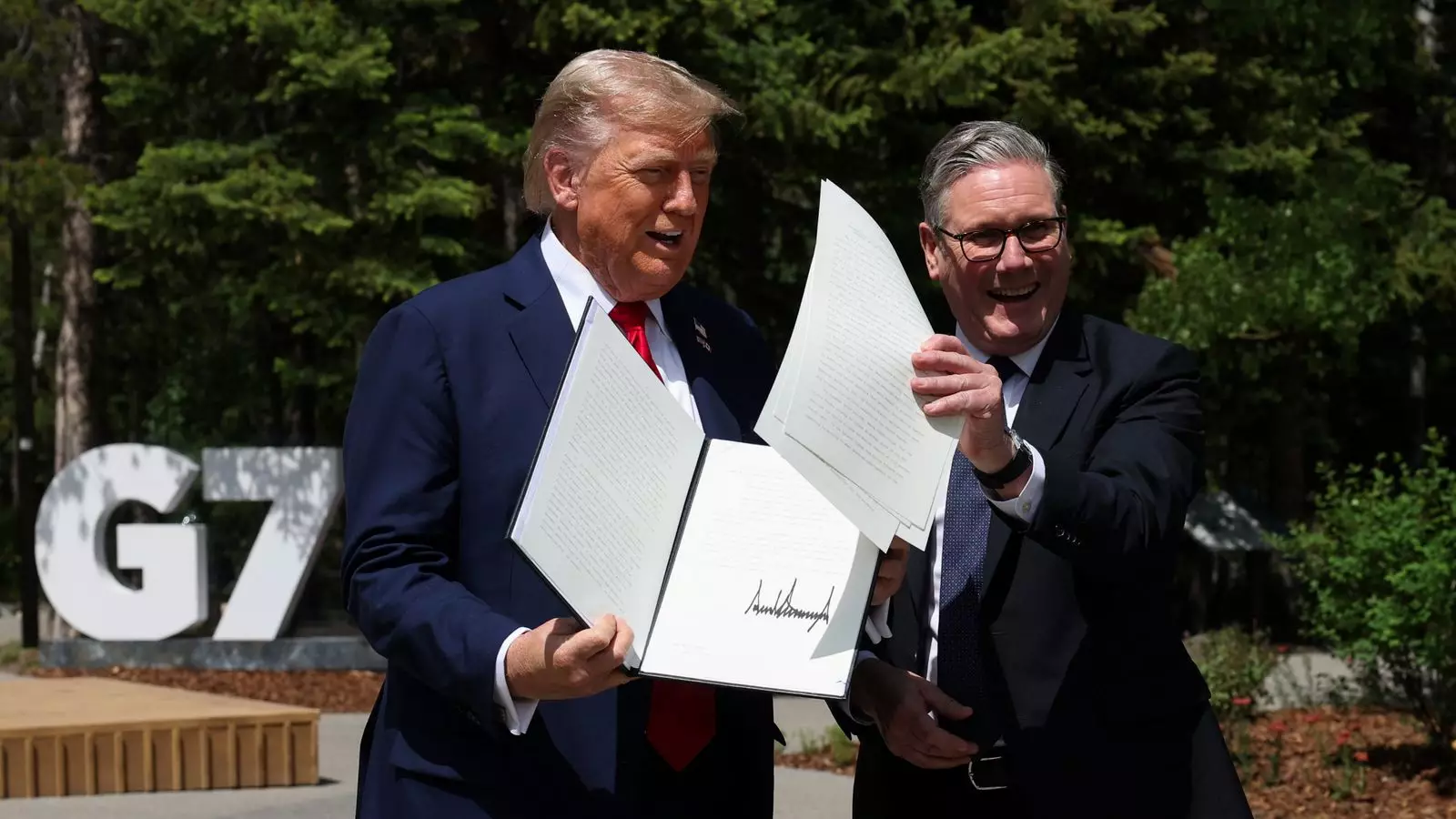The recently signed UK-US trade deal, heralded by President Donald Trump as a monumental achievement, raises significant concerns about the sincerity of its benefits for both nations. While politicians from both sides of the Atlantic tout the agreement as a “fair deal” promising job creation and economic prosperity, the rhetoric belies a more troubling reality—a trade partnership that may disproportionately favor the United States, promoting economic disparity rather than equality.
The Rhetoric of “Fairness”
At the G7 summit, President Trump declared the trade deal to be “done,” a phrase that sounds reassuring but is deceptively simplistic. Claims of fairness and strength are often used to veil the complexities involved in international trade, especially regarding tariffs and market access. Starmer’s description of the deal as “really important” appears to serve a political narrative rather than confront the reality underlying the negotiations. The notion that both countries emerge victorious risks trivializing the long-standing concerns regarding trade imbalances, particularly with the US leveraging its economic might to impose conditions favorable to its industries at the expense of the UK.
Loss of Sovereignty: The UK’s Diminished Standing
Inherent in the UK-US trade deal is a troubling element of diminished sovereignty. The UK’s historical position as a leader in global trade is under threat, increasingly subservient to US interests. Trump’s noncommittal stance on future tariffs, particularly concerning British steel exports, embodies a precarious relationship where economic dependence could dictate policy decisions. Such uncertainty does not align with a sovereign trade agreement; instead, it breeds anxiety as the UK navigates an uneven landscape marked by the whims of a foreign power.
The Myth of Job Creation
Proponents of the deal insist that it will generate jobs and economic growth in both countries. However, empirical data from similar trade agreements suggests that the promised jobs often fail to materialize or come at the cost of existing employment. Industries that may benefit from the deal could very well undermine traditionally strong sectors in the UK, such as manufacturing, as domestic businesses struggle to compete against larger, more agile US corporations. The focus on job creation appears more as a lure than a tangible guarantee, masking potential job losses as firms adapt (or fail to adapt) to an altered economic landscape.
A Political Pact or True Partnership?
The personal rapport between President Trump and Prime Minister Starmer, described as a friendship forged quickly, raises concerns about whether this relationship risks prioritizing political alliances over genuine national interests. Trump’s comment on Starmer’s “liberalism” highlights their ideological differences, yet it is disconcerting how these distinctions seem to fade within the context of the deal. Strong political connections are important; however, they should not supersede more pressing concerns such as domestic welfare, fair labor practices, and sustainability in trade.
The Loose Ends and Political Theatre
The visual slip of Trump struggling with the preliminary agreement—papers falling haphazardly from its binding—serves as a metaphor for the fragility of this trade deal. The incident underscores a reality where the lofty language of bilateral agreements is often tested by logistics and execution. The uncertainty surrounding specific details, especially regarding tariffs, further complicates the scenario. While Starmer fervently defends the deal in public, the backroom complexities and unvoiced anxieties echo more potent truths than the politically sanitized rhetoric suggests.
As the UK enters this new chapter of trade with the United States, it must approach this pact with a critical eye. The promise of benefits should not cloud the potential risks involved. This partnership, while advantageous on the surface, could prove to be an uneven arrangement susceptible to exploitation if not scrutinized judiciously. The UK must remain vigilant, ensuring that its sovereignty and economic interests are not sacrificed at the altar of political friendship and naïve optimism. The alignment with US interests should not come at the cost of the UK’s foundational principles and long-term prosperity.



Leave a Reply